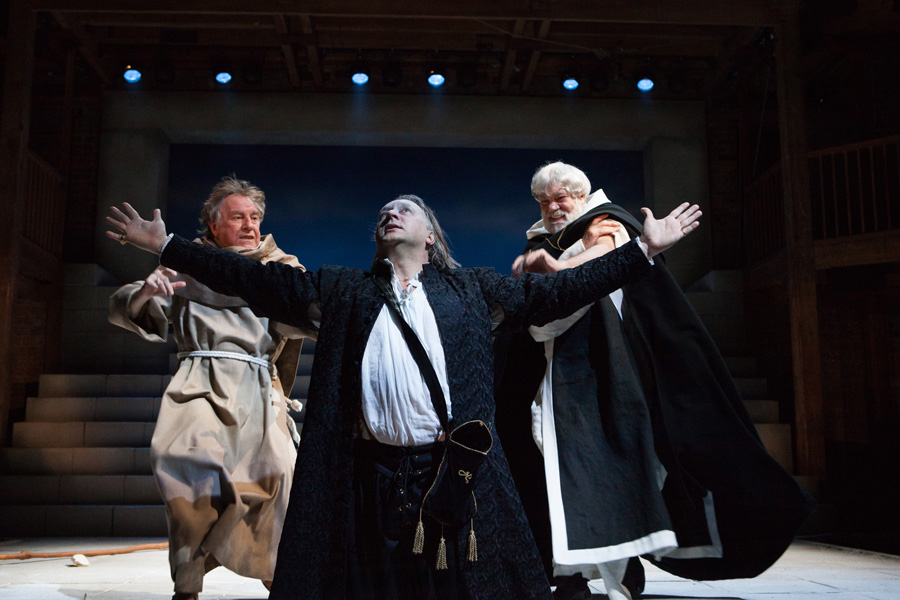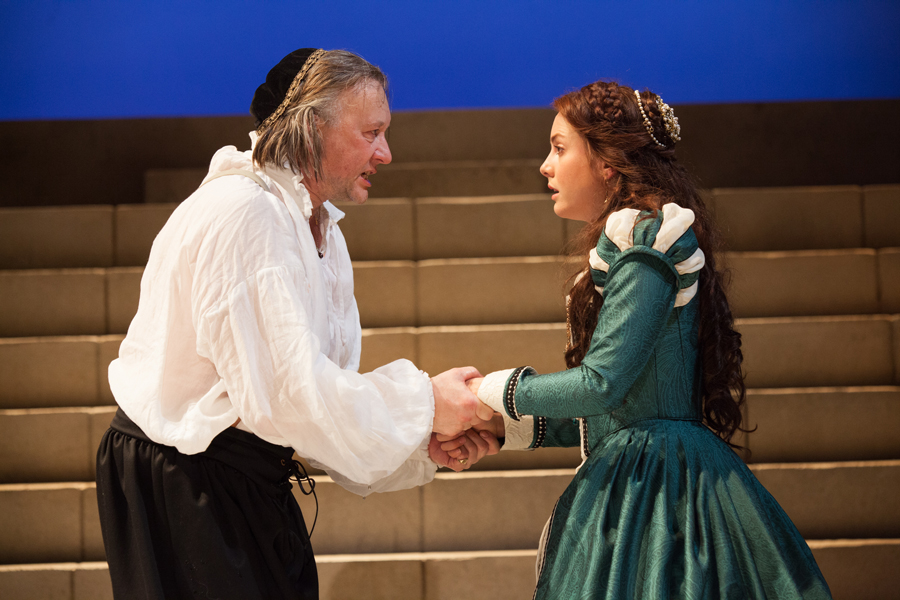 The different faiths are rubbing along together until politics and money get in the way and then all sides justify their actions as religious duty and malicious antisemitism provides a rationale for action. Not the Middle East today but Malta circa 1565 in Marlowe’s play, The Jew of Malta.
The different faiths are rubbing along together until politics and money get in the way and then all sides justify their actions as religious duty and malicious antisemitism provides a rationale for action. Not the Middle East today but Malta circa 1565 in Marlowe’s play, The Jew of Malta.
Here Malta is ruled by the Knights of St John (Knights Hospitaller) under Governor Ferneze, ostensibly as an outpost against the Ottoman Turks, although Ferneze is happy to pay the Turks protection money not to be invaded by them. Barabas is the richest merchant in the region but Ferneze plunders his fortune to pay off the threatening Ottomans. The Christian Knights justify taking his money – as a Jew, Barabas is cursed and sinful. He is understandably indignant: “What, bring you Scripture to confirm your wrongs? Preach me not out of my possessions.”
This is evidently a revenge tragedy – the dominant motive is revenge, here for a series of very real injuries. But Marlowe’s play goes beyond revenge, satirising religious hypocrisy, statesmanship and the human condition. We know where Marlowe stands when the Prologue, in the person of Machievel(li) says, “I, Machievel, count religion but a childish toy. And hold there is no sin but ignorance.” No one individual or community’s stupidity or vices are spared Marlowe’s ridicule and criticism in what might be the earliest film noir script.
Because this injustice is the trigger for Barabas to embark on a road to hell paved with anything but good intentions. Nobody – Christian, Turk, or even Jew – is safe from his increasingly bloody revenge, especially once he finds a kindred spirit in a newly-purchased slave Ithamore, and together they revel in ever more ingenious methods of murder and even mass slaughter.
At first sight, Marlowe’s play, with its eponymous anti-hero Barabas (whose namesake is the criminal released by Pilate instead of Jesus, at the behest of a Jewish mob according to the Christian Gospels), looks even more uncomfortable viewing for a Jewish audience than The Merchant of Venice. And it seems like a worryingly timely revival in the light of recent antisemitism. But 16th-century Malta is a bear pit where Turks and Christians fight indiscriminately and Marlowe allows Barabas to have the stage to himself to confide in his audience before they get to meet any of the island’s other amoral schemers (including a brace of villainous friars) who are, after all, after his money – or his fair daughter Abigail. And even before Barabas appears, his gleeful Machiavellian plotting comes with the endorsement of Machiavelli himself in that prologue.
Director Justin Audibert’s exhilarating revival points up Marlowe’s vicious humour and intelligence with Jasper Britton’s ruthless Jew as its poster boy. It has all the colour and sweep of a Renaissance painting, thanks to designer Lily Arnold’s glorious vision. Her staging is simple – marble-like steps sweep down from an upper level to the lower thrust stage which has as its focus a trough of water that proves wonderfully useful. And she fills the space with an entrancing palette of colour on costumes that swirl around the place, enhancing Lucy Cullingford’s choreography and in their turn enhanced by Oliver Fenwick’s lighting.
Audibert’s cast clearly enjoy creating equally colourful characters, led by Britton’s frighteningly practical and fearsomely intelligent Barabas, and Lanre Malaolu’s gleeful Ithamore, revelling in his promotion to partner in crime. Geoffrey Freshwater and Matthew Kelly, as those two wicked friars, make as gleeful a pair of plotters as any on the Renaissance stage. There’s attractively seductive work from Beth Cordingley’s avaricious courtesan, and Catrin Stewart makes a feisty Abigail, hand in glove with her father until… Well, that would telling, you’ll have to go and see it to find out!
The terrifc ad hoc klezmer band has added value for those in the know. The pre-show music is traditional wedding fare, ‘Chosen Kallah Mazel Tov’ ('Good Luck to Groom and Bride') and the show opens with another Jewish wedding staple – Barabas leads the cast singing ‘Erev Shel Shoshanim’ ('Evening of Roses') from the Song of Songs, in the popular setting by Yosef Harar and Moshe Dor (timed well for the production’s early April opening as it is part of the Passover Service too). And throughout the show Gareth Ellis’s musicians bring their own colour to the action, thanks also to Jonathan Girling’s original music.
Does it all leave a bad taste in the mouth though, as the action reaches its apocalyptic climax? By that time, everyone has behaved badly and Barabas is not the only one to face retribution. So however Marlowe’s contemporaries reacted, modern audiences are no more likely to burst into gleeful laughter than they would at the climax of Stephen Sondheim’s Sweeney Todd.
By Judi Herman
The Jew of Malta runs until Tuesday 8 September. 7.30pm & 1.30pm. £5-£45. Swan Theatre, Straford-On-Avon CV37 7LS; 084 4800 1110. www.rsc.org.uk


